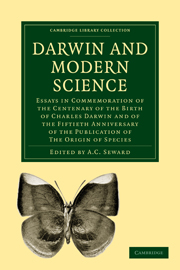 Darwin and Modern Science
Darwin and Modern Science Book contents
- Frontmatter
- PREFACE
- Contents
- LIST OF ILLUSTRATIONS
- DATES OF THE PUBLICATION OF CHARLES DARWIN'S BOOKS AND OF THE PRINCIPAL EVENTS IN HIS LIFE
- I Introductory Letter to the Editor from SIR
- II Darwin's Predecessors
- III The Selection Theory
- IV Variation
- V Heredity and Variation in Modern Lights
- VI The Minute Structure of Cells in Relation to Heredity
- VII “The Descent of Man”
- VIII Charles Darwin as an Anthropologist
- IX Some Primitive Theories of the Origin of Man
- X The Influence of Darwin on the Study of Animal Embryology
- XI The Palaeontological Record. I. Animals
- XII The Palaeontological Record. II. Plants
- XIII The Influence of Environment on the Forms of Plants
- XIV Experimental Study of the Influence of Environment on Animals
- XV The Value of Colour in the Struggle for Life
- XVI Geographical Distribution of Plants
- XVII Geographical Distribution of Animals
- XVIII Darwin and Geology
- XIX Darwin's work on the Movements of Plants
- XX The Biology of Flowers
- XXI Mental Factors in Evolution
- XXII The Influence of the Conception of Evolution on Modern Philosophy
- XXIII Darwinism and Sociology
- XXIV The Influence of Darwin upon Religious Thought
- XXV The Influence of Darwinism on the Study of Religions
- XXVI Evolution and the Science of Language
- XXVII Darwinism and History
- XXVIII The Genesis of Double Stars
- XXIX The Evolution of Matter
- INDEX
XXVII - Darwinism and History
Published online by Cambridge University Press: 07 September 2010
- Frontmatter
- PREFACE
- Contents
- LIST OF ILLUSTRATIONS
- DATES OF THE PUBLICATION OF CHARLES DARWIN'S BOOKS AND OF THE PRINCIPAL EVENTS IN HIS LIFE
- I Introductory Letter to the Editor from SIR
- II Darwin's Predecessors
- III The Selection Theory
- IV Variation
- V Heredity and Variation in Modern Lights
- VI The Minute Structure of Cells in Relation to Heredity
- VII “The Descent of Man”
- VIII Charles Darwin as an Anthropologist
- IX Some Primitive Theories of the Origin of Man
- X The Influence of Darwin on the Study of Animal Embryology
- XI The Palaeontological Record. I. Animals
- XII The Palaeontological Record. II. Plants
- XIII The Influence of Environment on the Forms of Plants
- XIV Experimental Study of the Influence of Environment on Animals
- XV The Value of Colour in the Struggle for Life
- XVI Geographical Distribution of Plants
- XVII Geographical Distribution of Animals
- XVIII Darwin and Geology
- XIX Darwin's work on the Movements of Plants
- XX The Biology of Flowers
- XXI Mental Factors in Evolution
- XXII The Influence of the Conception of Evolution on Modern Philosophy
- XXIII Darwinism and Sociology
- XXIV The Influence of Darwin upon Religious Thought
- XXV The Influence of Darwinism on the Study of Religions
- XXVI Evolution and the Science of Language
- XXVII Darwinism and History
- XXVIII The Genesis of Double Stars
- XXIX The Evolution of Matter
- INDEX
Summary
1. Evolution, and the principles associated with the Darwinian theory, could not fail to exert a considerable influence on the studies connected with the history of civilised man. The speculations which are known as “philosophy of history,” as well as the sciences of anthropology, ethnography, and sociology (sciences which though they stand on their own feet are for the historian auxiliary), have been deeply affected by these principles. Historiographers, indeed, have with few exceptions made little attempt to apply them; but the growth of historical study in the nineteenth century has been determined and characterised by the same general principle which has underlain the simultaneous developments of the study of nature, namely the genetic idea. The “historical” conception of nature, which has produced the history of the solar system, the story of the earth, the genealogies of telluric organisms, and has revolutionised natural science, belongs to the same order of thought as the conception of human history as a continuous, genetic, causal process—a conception which has revolutionised historical research and made it scientific. Before proceeding to consider the application of evolutional principles, it will be pertinent to notice the rise of this new view.
2. With the Greeks and Romans history had been either a descriptive record or had been written in practical interests. The most eminent of the ancient historians were pragmatical; that is, they regarded history as an instructress in statesmanship, or in the art of war, or in morals.
- Type
- Chapter
- Information
- Darwin and Modern ScienceEssays in Commemoration of the Centenary of the Birth of Charles Darwin and of the Fiftieth Anniversary of the Publication of The Origin of Species, pp. 529 - 542Publisher: Cambridge University PressPrint publication year: 2009First published in: 1909
